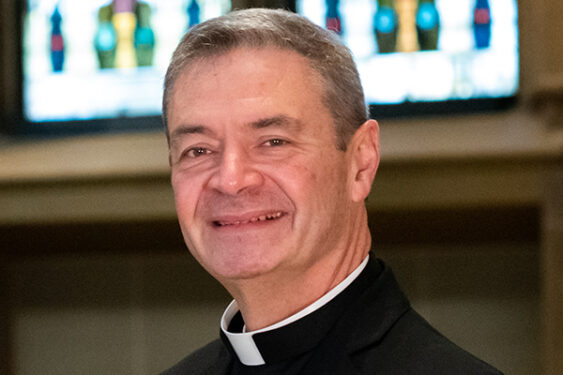By Bishop Robert Brennan
As Catholics, we take our right and responsibility to take part in the political process very seriously, indeed by voting, but also by engaging with civic and party leaders in the development of public policy.
The Church does not engage in partisan politics. However, individual Catholics play important roles in both major political parties as well as various smaller parties and political organizations. That is a good thing. We need Catholic voices in the dialogues, “scrutinizing the signs of the times and interpreting them in the light of the Gospel.” (Second Vatican Council, Pastoral Constitution on the Church in the Modern World #4.)
Most of us exercise our political rights and responsibilities by voting with a well-formed conscience and an understanding of the major issues before us.
While avoiding partisan politics, the Church gives witness to the dignity of every human person, created in the image and likeness of God from conception until natural death and at every moment in between. This truth is the foundation of all principles in our political engagements, from our rejection of abortion, euthanasia, racism, and antisemitism to our support of efforts to break the cycle of poverty, care for the environment, defend the sanctity of marriage and the family, protect religious liberty, and promote genuine, comprehensive immigration reform.
Among the matrix of human rights that flow from our God-given dignity, the right to life itself is foundational. Without it, all other rights crumble.
Here in New York state, this November, we will be voting not only for candidates for public office but also on Proposal 1, sometimes referred to as the “Equal Rights Amendment.” The name of this proposal sounds promising, as many of us are inclined to advance equal rights. However, the text of Proposal 1 is broadly written and would have dangerous consequences if enacted. It would cement abortion on demand without restriction at any point during pregnancy and strip away the authority of parents to make decisions for their minor-aged children in matters such as “gender-affirming” treatments and surgeries.
I urge you to educate yourself about this proposed amendment and to reject it when you cast your vote this year.
In the coming weeks, you may also hear about this in your parish and on social media as we strive to inform you of the alarming details of Proposal 1 so that you are well-educated before heading to the ballot box.
The United States Conference of Catholic Bishops (USCCB) has issued a document — called “Forming Consciences for Faithful Citizenship.” — to guide the faithful as they undertake the serious responsibility of voting. This text helps us to form our consciences in the truth of the Gospel so that we can make prudential judgments about candidates and propositions. Please take the time to review the document on the USCCB’s website.
Finally, please join me in praying for the guidance of the Holy Spirit in our discernment so that we as a nation, state, and city, may choose leaders and representatives who hear God’s Word, live in his love, and keep the ways of his truth.
We pray for an honest and safe election. We then hope that all people of goodwill unite behind those elected to foster the common good.




The Chirch needs to Come out more strongly on Prop 1. A letter in every bulletin, to every parishioner and message at every mass.